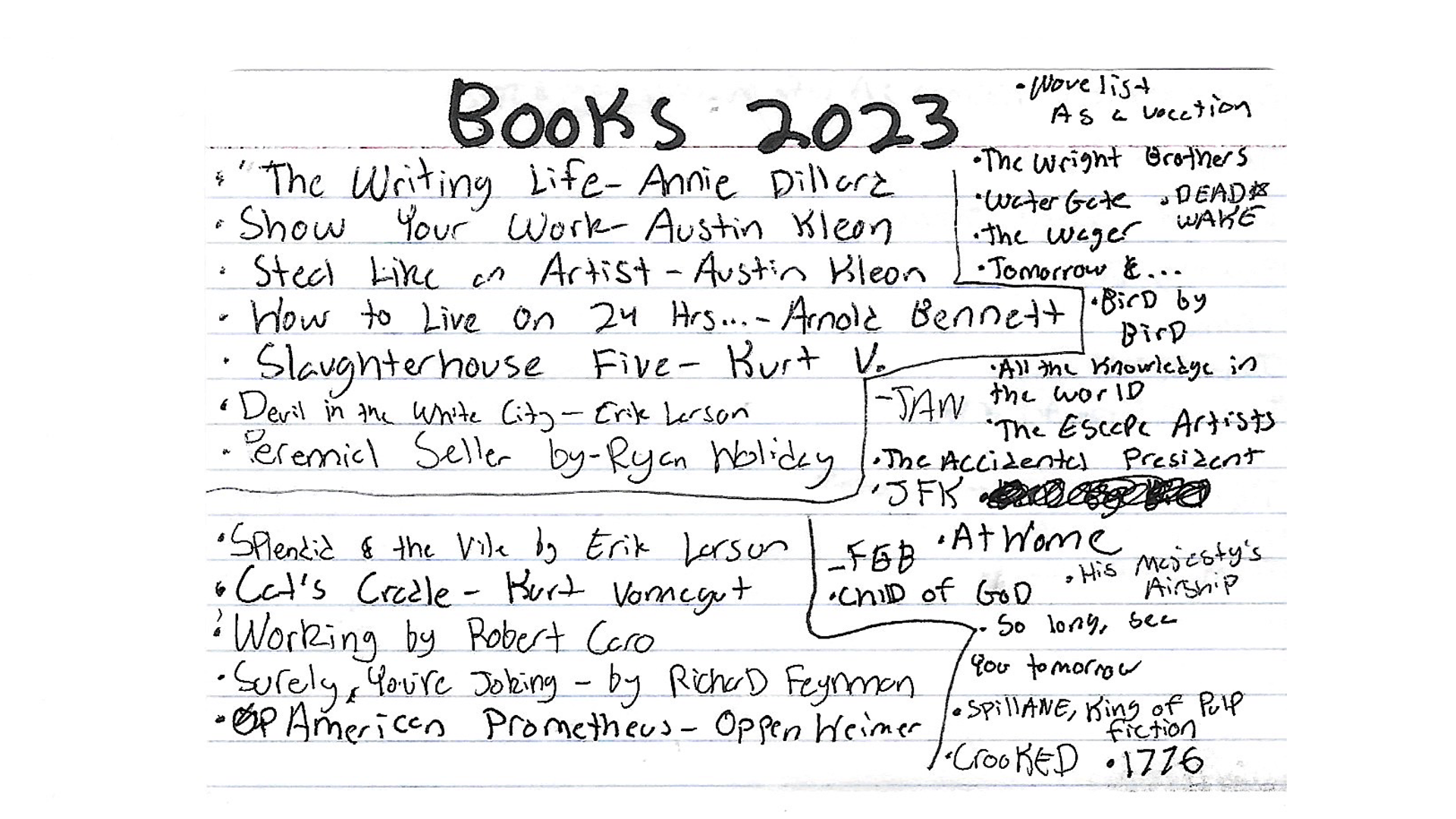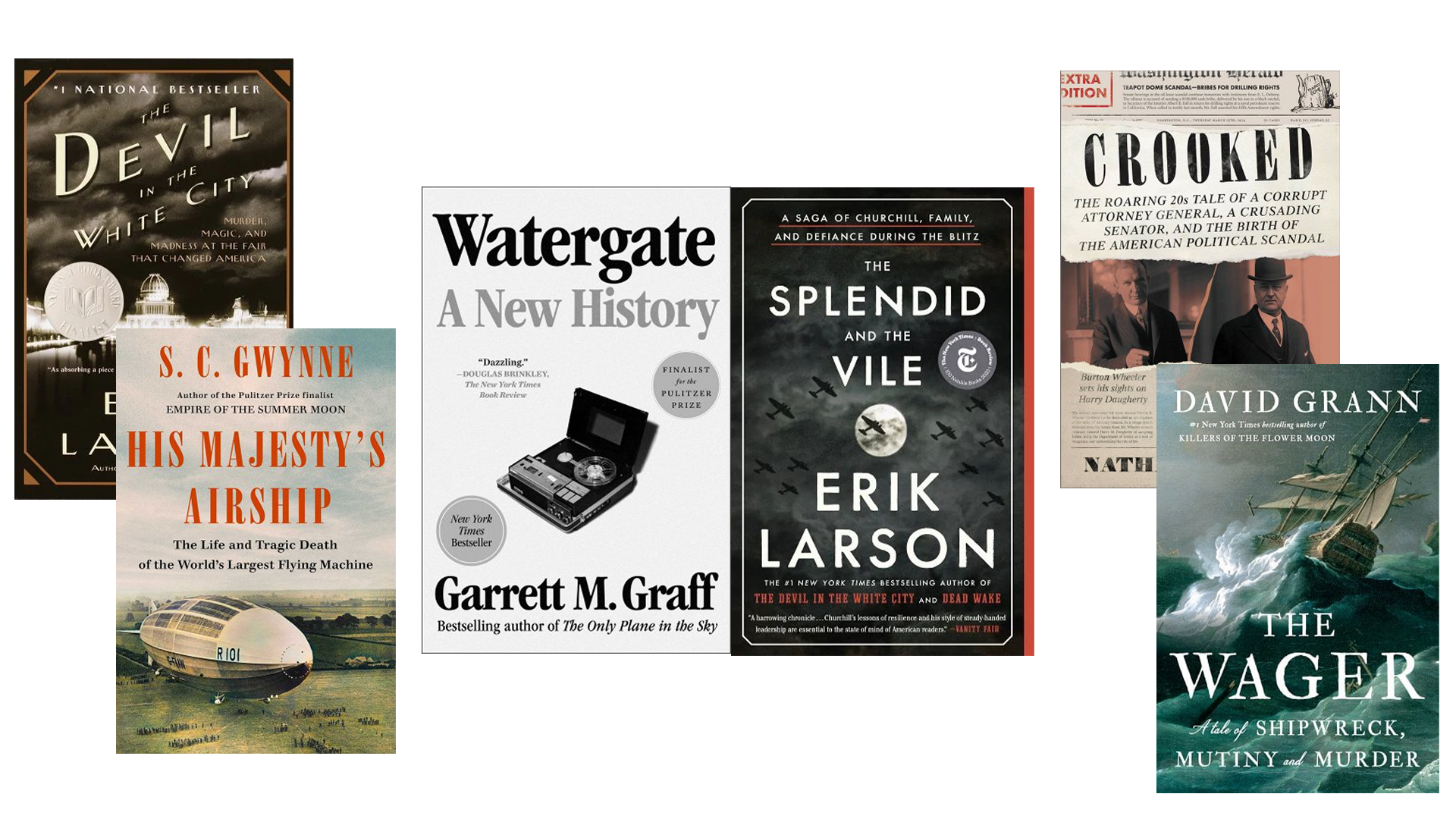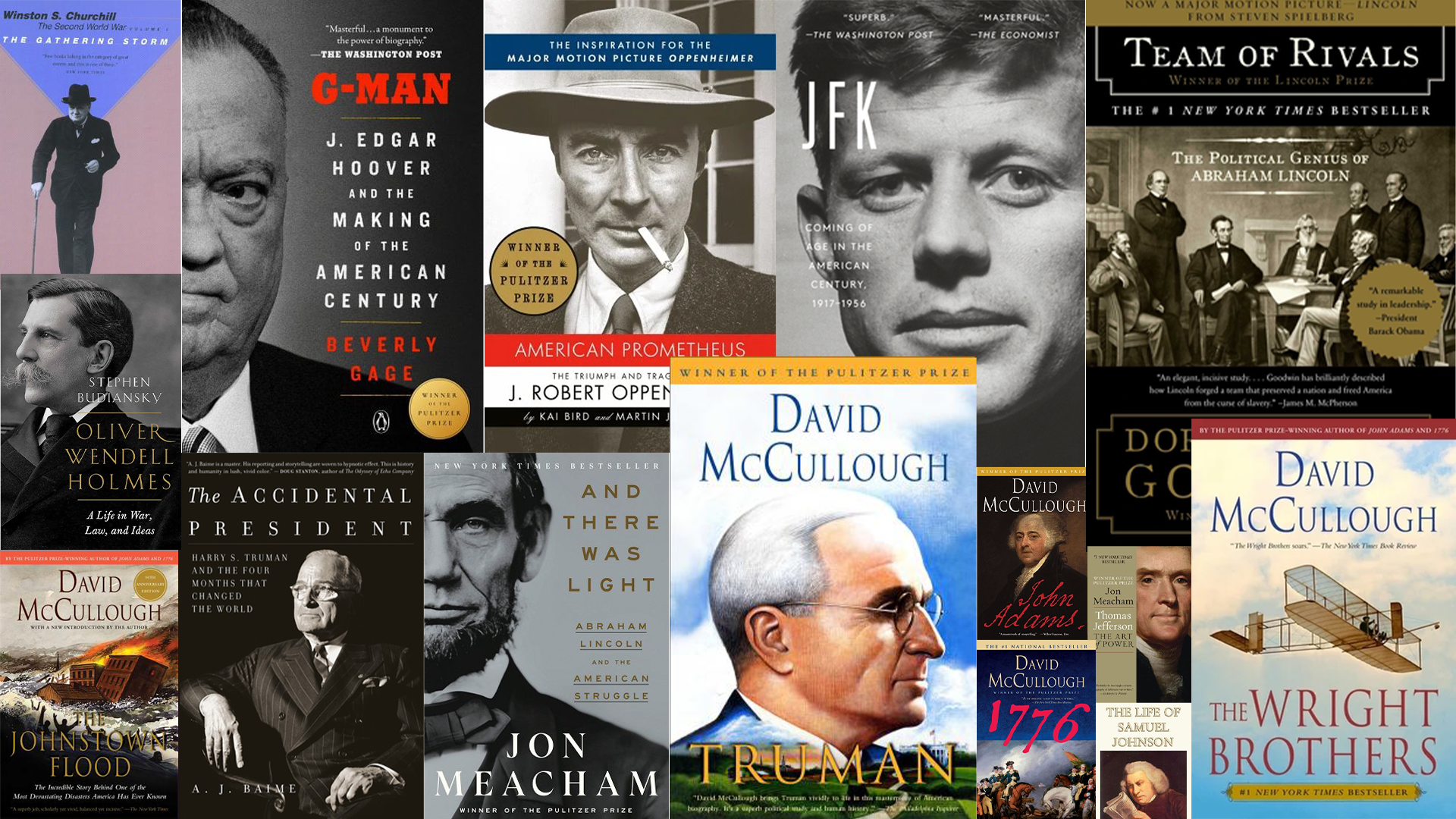
This was the first year I kept a detailed log of all the books I read. I don’t remember what compelled me to do this, but I’m glad I did. I’ll try to do something like this every year from now on!
History, biography, and creative non-fiction or narrative non-fiction were the most read categories by a landslide, and for a good reason, because they are the best genre of books ever.
Here is my Year in Reading for 2023. These books impacted me most as a person and taught me a lot about life and other people. (I stole this post format from Austin Kleon.)
Narrative Non-Fiction

The Splendid and the Vile by Erik Larson falls neatly into the category of narrative nonfiction and is a clear favorite of mine. Rarely does a book make me cry, but this book did just that. (I also cried after finishing Truman by David McCullough. Don’t you judge me.) Larson paints a uniquely personal portrait of Winston Churchill, his family, and his close advisors. Plus, it gave me a unique look at what it was like to live in London during the Battle of Britain. The Devil in the White City, also by Erik Larson, was an incredible narrative non-fiction book. It was just as engaging as Splendid but had fewer practical applications and lessons. The Wager by David Grann (Killers of the Flower Moon) was also a fun read. It was about a shipwreck and mutiny in the 18th Century. Again, it is more of a fun story than practical lessons, but that doesn’t make it any less enjoyable to read. His Majesty’s Airship by S.C. Gwynne also falls into that category.
Watergate by Garrett Graff is another informative narrative non-fiction book. Graff weaves together the different characters and motivations behind the Watergate scandal. One practical lesson: Watergate was not some grand conspiracy. “Labeling it a ‘criminal conspiracy’ implies a level of forethought, planning, and precise execution that isn’t actually evident at any stage of the debacle,” Graff writes. “Instead, the key players slipped, fumbled, and stumbled their way from the White House to prison, often without ever seeming to make a conscious decision to join the cover-up.” I suspect that’s how most moral failures occur. It’s a slippery slope, one tiny decision after another. It reminds me of Hemingway's answer about how someone goes bankrupt: “Two ways. Gradually, then suddenly.”
If you like riveting political tales, Crooked by Nathan Masters is also a great read. It documents the corruption of the Teapot Dome Scandal and the strange beginnings of the Department of Justice.
History and Biography

Each of the books above could be categorized as history and biography, but since I also read more “traditional” history and biography books, I separated them.
It’s impossible to say which biography was my favorite because many were so good. I read American Prometheus, J. Robert Oppenheimer’s biography, to prepare for Christopher Nolan’s biopic, and the book was just as good as the movie. The prologue sucks you right into the conflict of Oppenheimer’s life, and the rest of the book follows suit. The writing is amazing, and you learn a lot about the early 20th-century world of physics. The fact that his life is one of the most tragic stories of any American helps.
Up there with Oppenheimer’s bio is JFK: Coming of Age in the American Century. This book chronicles the early years of JFK’s life and ends right before he begins his campaign for the presidency. (I’m anxiously waiting for volume two.) The third book in this three-way race that probably no one besides me cares about is Truman by David McCullough. As I mentioned before, I cried at the end of this book. I cried not because Truman was a revolutionary world leader but because McCullough did an amazing job bringing me into Truman’s life as if I was watching the entire thing myself. I felt like I knew the man – like I knew what made him tick – and naturally, I was upset at losing someone I knew. Plus, Truman and I are both from Missouri, which makes me proud.
I also read and loved Oliver Wendell Holmes, Jr: A Life in War, Law, and Ideas. Holmes’ philosophy on writing and thinking guides my writing and thinking. He believed it should be clear, focused, and free of legalese or jargon. He loved to read and learn, and that always inspires me. I understand this is a biography, but I thought the author spent too much time on Holmes’ war experience, though I don’t much like war stories. One fun anecdote from that period, though, is when Holmes yelled at Abraham Lincoln, “Get down, you damn fool!” when Abe paid a visit to Fort Stevens, and his top hat was sticking out over cover while trying to get a glance at the battle.
The Johnstown Flood and 1776 by David McCullough are both riveting histories. The former has a moral that is also illustrated in Watergate and Crooked: just because people are in power or have influence does not mean they are acting responsibly. If I had a chance to speak at a high school, that is one message I would try to get locked into people’s heads. 1776 fooled me a bit. I read it on the 4th of July, hoping it would provide some background on the Declaration of Independence and America’s freedom. It did little of that. Rather, it’s more of a mini-biography of George Washington, documenting some of the Revolutionary War's early battles, defeats, and victories. The Wright Brothers by David McCullough wasn’t as detailed as I thought it would be, probably because they were so secretive and liked to stay out of the limelight, but it was still incredible. The philosophy on learning, thinking, and doing the brothers inherited from their father is encouraging, and their story is a true American one. They were poor boys from Dayton, Ohio who worked hard, took risks, and completely changed the world.
John Adams and Thomas Jefferson: The Art of Power gave me what I was looking for with 1776, mainly how the politics of the age helped shape the birth of the nation. They were both exceptional.
G-Man, a biography about J. Edgar Hoover, was remarkable. Hoover’s tenure in the Bureau from 1924-1972 was ridiculously long. He survived many presidents (some he got along with, others less so), ideologues (communism, which he fought ‘till his dying day), and controversies.
And There Was Light and Team of Rivals are two books that helped me learn more about Abraham Lincoln, The Civil War, and the greater political questions that were being debated at that time. Team of Rivals is a multi-faceted biography covering Lincoln, Edward Bates, Henry Seward, Salmon P. Chase and other members of the Lincoln Cabinet. What’s noteworthy about his cabinet was most of the people he appointed to it were his competitors for the Republican primary campaign. They’d all lost to Lincoln, but were honored to serve him. And though each had a differing political philosophy, Lincoln trusted them deeply. He didn’t always do exactly what they wanted, but he at least gave their ideas the time of day and reasoned them carefully.
The Accidental President piggybacked off Truman and went deeper into the tumultuous four months from April to August of 1945 when Truman took over from FDR, the Potsdam Conference with Churchill and Stalin, and Truman’s controversial decision to drop the atom bombs.
I read James Boswell’s The Life of Samuel Johnson which was a unique book, and I understand why it’s stood the test of time.
I finally read The Gathering Storm, the first volume of Winston Churchill’s Memoirs of the Second World War, and it was amazing. I learned a lot about the period between the end of World War One and the beginning of World War Two. Mainly, what England and other European countries did wrong that allowed Germany to break the Treaty of Versailles and build up their army. Put simply: Neville Chamberlain was a horrendous judge of character. No matter how many times Hitler broke his word, Chamberlain gave him more and more, insisting that he would eventually stop. News flash: he didn’t stop.
Other Non-Fiction and Memoir
The Writing Life by Annie Dillard and Bird by Bird by Anne Lammot are helpful, spunky guides to writing, thinking, and life. Steal Like an Artist and Show Your Work by Austin Kleon and Perennial Seller by Ryan Holiday are three great books for creatives and artists.
How to Live on 24 Hours a Day, a book written in 1908, is one of the most practical guides to productivity and time management I’ve ever read.
Surely, You’re Joking Mr. Feynman is a fun read full of insightful stories from an intellectual hero of mine. Feynman never took himself too seriously and always questioned everything he learned. He wasn’t satisfied until he truly understood how something worked and believed others should have the same mindset. I agree. Working by Robert Caro gave a unique behind-the-scenes to a prolific historian and biographer who started a book about Lyndon B. Johnson in the 1970s and is still writing it. Caro provides background about his career and gives helpful tips, strategies, and frameworks for aspiring biographers. Novelist as a Vocation by Haruki Murakami does the same, but from a novelist’s perspective.
Fiction
This was the first year I ever got into some fiction, but even then, it was just a few books. Everyone was raving about Tomorrow and Tomorrow and Tomorrow, so I had to read that, and I’m glad I did. I read a few books by Cormac McCarthy after reading an interview he gave to an old magazine – Child of God and The Road – on the same weekend he ended up passing away. I found that very sad but also touching. Right before this great American novelist breathed his last, I was able to enjoy his works, just for a brief moment, while he was still on Earth. I find that sobering, for books connect us to other people in many ways. I read Slaughterhouse Five and The Cat’s Cradle by Kurt Vonnegut, liking the latter more. I also read Oliver Twist. So Long, See You Tomorrow was a sad book, but it kept me turning every page.
Tagged